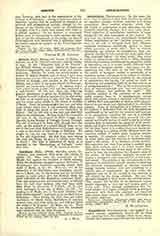

Assimilation, PSYCHOLOGICAL. —As applied to a mental process, assimilation derives all its force and meaning from the analogy which many educationists have found to exist between the way in which food is incorporated into the living tissue and the manner in which truth is acquired by the growing mind. That education means the assimilation of truth is almost a commonplace in modern pedagogy. Few, however, have felt the full force of the comparison or realized how completely the psychological in this as in other instances follows on the lines of the physiological. Just as the living cell cannot delegate the task of assimilation, so the mind cannot by any contrivance of educational methods evade the task of performing the assimilative process for itself. All that the teacher can do is to prepare the material and to stimulate the mind of the pupil; the pupil himself must perform the final act of acquiring knowledge, namely the act of incorporating into his mind the truth presented to him. In the second place, the mind cannot take over into its own substance a complex truth as such. The truth must first be broken up into less complex component parts, which are assimilable by the mind in its present condition of development.
There is little profit, for example, in placing before the pupil a finished essay, unless the pupil is taught to analyze the finished literary product into its constituent elements, and to reconstruct those elements into a living whole. This, of course, implies much more than the task of summarizing each paragraph and labelling it more or less happily. When the term assimilation is used with reference to mental development, it is well to remember that, while it originally referred to the building up of anatomical elements, these elements, once constructed, have an immediate physiological bearing. Each particle of matter that is lifted into the living tissue acquires thereby a functional unity, that is, it is brought into functional relation with every other particle of the organism. Similarly, a truth once incorporated into the mind sheds its light on the entire mental content, and is in turn illumined by every previously assimilated truth. Acting on these principles, the up-to-date educationist insists: first, that each new truth should be not only an addition to the stock of knowledge of the pupil, but also a functional acquisition, something that stimulates the pupil’s mind to increased activity; secondly, that in every educational endeavor the center of orientation should be shifted from the logical center of the body of truth to be imparted to the present needs and capacities of the growing mind.
THOMAS EDWARD SHIELDS

